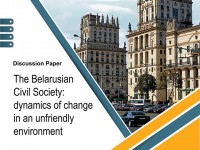We present a Discussion paper of dynamics of changes in the Belarusian civil society in 2015-2017.
Belarusan human rights defenders’ view on human rights activity and questions of cooperation between Belarusan human rights organizations

We present a research results report of Belarusan human rights organizations sector.
The research is conducted by the Center for European Transformation on the initiative of The Barys Zvozskau Belarusian Human Rights House with the expert support of the Legal Transformation Center (Lawtrend) and the Assembly of Pro-Democratic NGOs of Belarus.
Despite the general adverse environment for civil society organizations in Belarus, human rights organizations and initiatives keep being rather active and their number continues to increase (from 17 organizations in 2010 to 25 in 2013; although they basically can’t obtain a registration because of the current state policy). There are newly created organizations and initiatives that do not always have sufficient experience and understanding of how to cooperate, but they are ready to become effective members of the human rights community.
Earlier, there was already some work on the first joint project of a strategic concept for the Belarusan human rights community, which was accepted at the end of 2011. This work demonstrated that Belarusan human rights organisations did not often have any strategic planning and understanding of the way strategies should be implemented, though a need of a wider, holistic approach to activity was discerned accurately. In 2013, there was also big work aimed at defining joint strategic plans of cooperation for human rights defenders. At the end of 2015 and the beginning of 2016, human rights defenders acted with their joint strategic statements on the situation in the country and the necessary general actions.
At the moment, the orderer of this research and its partners are interested in the implementation of a new stage of work aimed at developing strategic cooperation between human rights organizations. This research is a tool of optimizing this work. Its goal is to reveal what leaders of Belarusan human rights organizations and initiatives think of such questions as the understanding of human rights activity, problems in the human rights sphere in Belarus, problems and achievements in cooperation between human rights organizations, strategic priorities for the Belarusan human rights community, the understanding of various aspects of human rights ethics, and the attitude to ethical self-regulation in the community.
As agreed upon with the orderer, a questionnaire survey among leaders of human rights organizations and initiatives was chosen as a research method. The sample of organizations was made by the orderer according to their purposes; in total — 30 organizations and initiatives (hereinafter organisations) have been surveyed; the research team polled 50 respondents. In compliance with the confirmed methodology, two people (leaders) from each organization had to take part in the research. However, due to various reasons (such as: one of leaders refused to participate in the survey; respondents considered themself leaders of another organizations; there was no second person in an organization), some organizations were represented in the survey by only one respondent. The field investigation phase was implemented in August-October 2016.
Some research questions have been aimed at revealing and fixing the current condition of Belarusan human rights organizations — their legal status, time of existence, size of organizations, etc. Although these questions concerned objective data, it is impossible to say that the received results reflect to the full the condition of the human rights organizations sector. Some relativity of the results has to do, first of all, with certain limitation of sociological methods of research because of the factor of subjective perception and space for respondents’ individual interpretations of formulations of questions and variants of answers. In this research, the limitations of the method are combined with the objectively ambiguous position of human rights organizations in Belarus — therefore, even apparently objective facts can be interpreted differently.
Nonetheless, we believe that they substantially reflect the state of affairs and represent the data that can be used by interested parties while their decision-making.
Download document 
Скачать документ 
Спампаваць дакумент 
About authors:
Alena Zuikova is an analyst of the Center for European Transformation, master of political science. She graduated from European Humanities University (Vilnius, Lithuania) with her bachelor’s degree in political science and European studies. She also graduated from the Institut d'Études Politiques de Lille (Institute of Political Science, Lille, France) with her master’s degree in European affairs. Her research interests include the European neighborhood policy, the Eastern Partnership, the European policy concerning Belarus, the European policy of development; civil society, CSOs’ role in Belarus democratization processes, and the Eurasian Economic Union.
Andrei Yahorau is the director of the Center for European Transformation, master of political science. He graduated from the Politology Department of Belarusan State University and received his master’s degree in political science at the same university. Since 2001, he has been working in the field of political research. His research interests include post-Soviet territory transformation, civil society, political transformations in Belarus and the Eastern Partnership region, and European studies.
Aksana Shelest is a senior analyst of the Center for European Transformation, PhD in sociology. She graduated from the Sociology Department of Belarusan State University and did her postgraduate studies in the Institute of Sociology of the National Academy of Sciences of Belarus, where she later worked as head of the sector of operational research methods and practices, as an academic secretary, and as head of the department of sociological studies techniques. She is an expert of the analytical group of the Humanitarian Techniques Agency. She is a laureate of the Award of the International Congress of Belarusan Studies in the nomination “Social and Political Sciences” (2013).
Others
-
Belarusan human rights defenders’ view on human rights activity and questions of cooperation between Belarusan human rights organizations
We present a research results report of Belarusan human rights organizations sector.
-
Social base of transformation programs in Belarus
We present a sociological research report (abridged version) of social base of transformation programs in Belarus.
-
Potential and opportunities for launching in Belarus the mechanisms to enjoyment of all human rights by persons with disabilities
We present a research results report (abridged version) of potential and opportunities for launching in Belarusan regions the mechanisms of local planning to promote, protect and ensure the full and equal enjoyment of all human rights and fundamental freedoms by all persons with disabilities.
-
Capacity of youth non-governmental organizations and Initiative groups for cooperation in addressing common objectives
The Centre for European Transformation, commissioned by the Office for European Expertise and Communication, in April-June 2015 was carried out a study to assess the interaction potential of Belarusan youth NGOs in the solution of common tasks.








Comments
Andrei Yahorau — Al Jazeera: “Lukashenko is irresponsible”
He said Belarus would likely face economic tightening not only as a result of the coronavirus pandemic but also a Russian trade oil crisis that worsened this past winter.